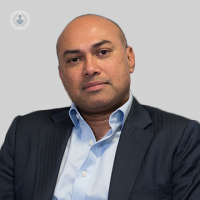Oesophageal cancer: early signs and survival rate
Written in association with:The oesophagus or gullet (food pipe) is a muscular tube that propulses food from the mouth into the stomach in the abdomen. Oesophageal cancer can occur anywhere along the food pipe and persistent acid reflux is a risk factor in developing the disease. The condition is more common in men than women and mainly affects those in their 60s or 70s.
We've asked leading London surgeon Mr Krishna Moorthy to explain the early signs of the disease, the survival rate and whether the condition is curable.

What causes oesophageal cancer?
The risk factors for developing oesophageal cancer are smoking, acid reflux, obesity and excessive alcohol consumption. Long-standing acid reflux causes a change in the lining of the oesophagus resulting in unstable cells that can lead to cancer.
What are the early signs of oesophageal cancer?
Dysphagia, which is pain on swallowing, is the most common presenting symptom. Other symptoms of oesophageal cancer could be unexplained weight loss, food regurgitation, blood vomiting (haematemesis) and persistent heartburn.
What is the survival rate for cancer of the oesophagus?
Around 20 years ago, the survival rate for oesophageal cancer was extremely poor. Five-year survival rates were less than 20%. Now, however, this is much better due to a number of reasons and survival has improved to 50-60%. One of the most important factors is specialisation.
Surgeons, oncologists and gastroenterologists working in specialist centres should undertake treatment of oesophageal cancers. Other factors include the introduction of chemotherapy and radiotherapy, early diagnosis, more accurate staging tests such as CT scan, better post-operative care and minimally invasive surgery.
Survival does depend on the stage of the disease. Patients treated for early-stage cancer can expect a permanent cure. Patients with long-term acid reflux may develop a condition called Barrett’s oesophagus. This is known to be associated with the development of oesophageal cancer. As a result patients with this condition undergo regular endoscopic surveillance. This can result in early detection of cancer and these can be treated with endoscopic methods, without the need for surgery.
Is cancer of the oesophagus curable?
Unfortunately, two-thirds of oesophageal cancer patients present with disease that is not curable. This is because the cancer is too large or has already spread by the time they experience symptoms.
In the other third of patients, cancer can be treated with curative intent. A combination of chemotherapy, radiotherapy and surgery can result in good long-term cure rates but this is dependant on the disease stage at the time of presentation.
Do not hesitate to book an appointment with Mr Moorthy for a first consultation if you're concerned about any of the above.


